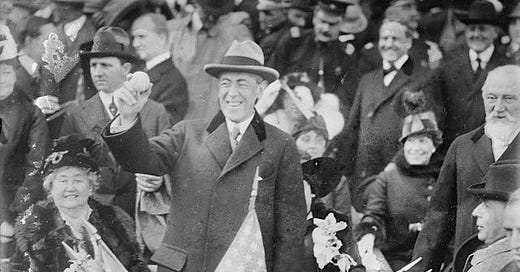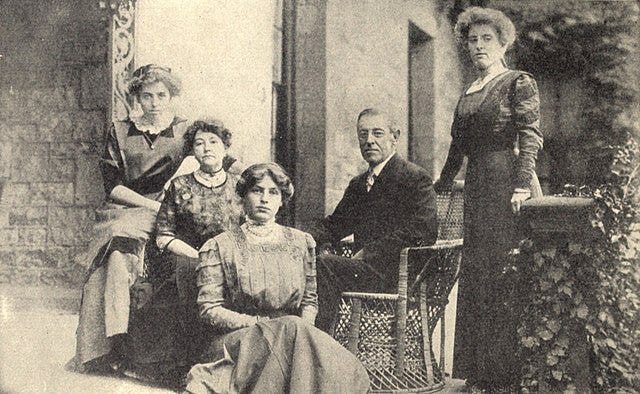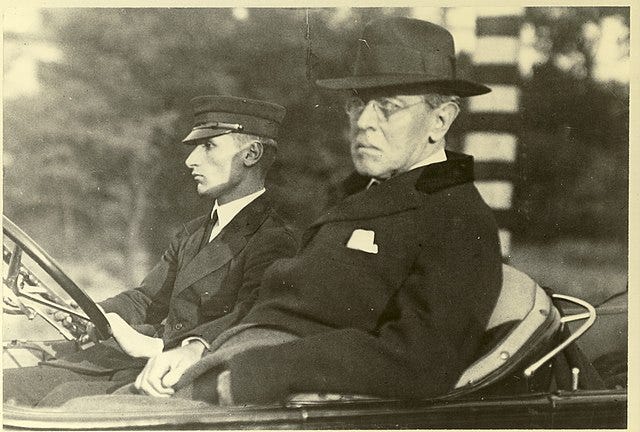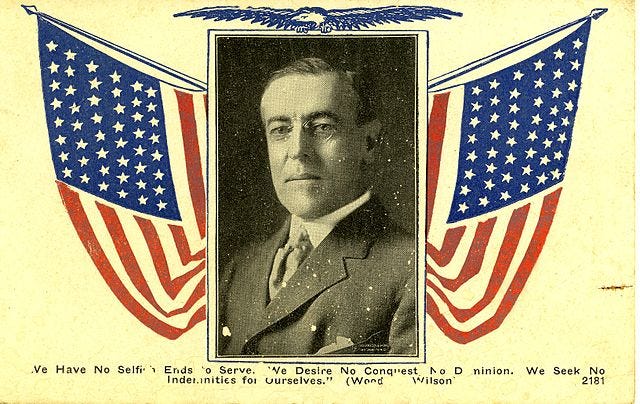Woodrow Wilson seems to be a president shrouded in controversy. While Republican opinion writers might find his policies over the top, a Democrat no doubt would agree with the vast majority of what he did.
Was Wilson’s administration a good one? As president of the United States, elected by the people, he represented our nation’s interests, and on top of this, he no doubt did it with the best of intentions at heart. In such a high stake, strenuous job, it seems only logical to assume that he honestly thought very hard about the choices he made and was fairly assured that he was doing the right thing with each decision reached. Whether you agree with his policies or not, is beside the point; what happened has happened, and now we must walk forward in this nation reaping either repercussions or rewards. You cannot undo history.
To address this split in political opinion however, it can be argued that perhaps both sides (liberals/progressives and conservatives) are right. President Wilson was handed one of the greatest crapshoots of the century; a struggling economy and a world war are two rather grandiose and messy situations. Based on these events and his personal beliefs, it seems that Wilson would have been backed in a corner on certain policy choices, and in so doing, opted to follow his personal comforts for government intervention. Of course, good or bad choices aside, this is often not made clear in history until farther down the road, when the next generation or so can look back and see the repercussions of selections from the people before.
This short post looks to take the controversy of Wilson’s presidency and aims to peer at it through a modern lens in order to consider its impacts in the present day. To do so, this essay will analyze two major questions: 1) how did Wilson lead, and why? and 2) what do the current reactions to his leadership have to say about America today? Its aim is to prove through this analysis, the reasons for the current mood in American politics, and to engage with the idea of why this country has the leadership it currently does.
As a political scientist, Wilson was very academically minded, and this led in part to how he ran our country during his terms. Academia lends itself to tunnel vision, a focus on the policies, and less on the people. This shows in his addresses and his work, particularly in the piece “The Leaders of Men,” where Wilson proposes to discuss what a true leader should look like.
According to Wilson, there are two types of men: those who lead by literature, and those who lead by action. In his opinion, those that are based in action are far more capable to lead men into change, whereas leaders of literature are more efficacious in stirring up the generations to come. If real change, real shifts, real momentum gained are desired, then the populace need look no farther than a man of action.
A man of action has no imagination. According to Wilson in this speech, “no popular leaders could write fiction.” It is not the man of action’s job to ponder ethereal concepts, but it is his to move forward on what is the most obviously right choice. The common man has no interest in hearing drawn out policies or reading hundred-page long bills. Instead, he wants easy to understand facts, and practical application. It is this type of thought and action though, that Wilson says the literary man finds so disgusting and off-putting about the common man. Literary men are book men, desk men, men who hide behind theories and ponder deep analytical questions. As one might joke, they are much too interested in their big thoughts to come down among the commoners.
A truly influential leader, a man who can lead the commoner, as it were, while having no imagination, lacks it according to Wilson simply so that he can avoid that most disagreeable function of doubt. Giving examples, Wilson argues that literary leaders are notorious second guessers, but the man of action will choose a course and stay with it. Literary men also tend to think grandiosely and long-term, dreaming of a perfect scenario. It is not wrong to want this, nor is there no place for this. But, as Wilson says,
“Men want the wisdom which they are expected to apply to be obvious, and to be conveniently limited in amount. They want a thoroughly trustworthy article, with very simple adjustments and manifest present uses. Elaborate it, increase the expenditure of thought necessary to obtain it, and they will decline to listen, you must keep it in stock for the use of the next generation…If you would be a leader of men, you must lead your own generation, not the next.”
Wilson goes on to list other necessary parts of a good leader; such things as absolute opinions and not well thought out compromises, an ability to read men in a group, public speaking skills, and an ability to operate on public demands not on personal will. An effective leader who gets the populace behind him looks past individual ability and looks toward unified potential. He is decisive and does not waver. It can be argued that Wilson put his money where his mouth was and was just such a man.
In pondering Wilson’s argument that the common man does not want an entrenched bureaucrat or a legally minded thinker as a leader, the American reader cannot help but wonder if this is one of the problems with America’s populace of today. Americans show little to no interest in politics, and what interest is shown is more a willingness to get into a heated name-calling match instead of an actual discussion. But who can blame the majority, when our senators and representatives squabble back and forth in party wars, digging in on either side simply because they do not want the other to win? Who can blame the blue-collar worker who gets home from work, but does not want to hear about the president’s latest updates to the immigration policy? It all seems so far away, and all so technical.
Perhaps this is also a reason why socialism has generated more interest in the past years. As Deirdre McCloskey argues in her article “Economic Liberty as Anti-Flourishing,” Marxism is easy to understand. If the common man truly looks for ease over all else, then this would give Marx’s theory a certain shine. Add to that a call to action and the promised changes that seem so much more tangible and approachable than big government skirmishes, and one can see why a college student, disenfranchised with the yelling match in the capital, would side with Bernie Sanders and his promise to do more than just argue about student debt.
What then is to be done with this knowledge? Leadership is a key factor to motivating the populace of a nation. Perhaps it is time for America to review the kinds of men and women she is electing and ponder whether they are the best for her people. The trajectory of the nation is in the hands of the voter. Perhaps it is time for Americans to think carefully and vote even more shrewdly. The citizen under the star-spangled banner has been granted what few other citizens under others can expect: the right to a say in where their nation is going, and who will be at the helm while it sails.
This interest in the nation’s trajectory will never arise in today’s current climate. Instead it must take a concerted effort to raise awareness and explain the vitality of a nation awake to its call. As Wilson points out, America needs a firm leader, one who can lead without wavering. The only way this can be accomplished is through those who do understand standing up, and proclaiming their knowledge, passing it on to the next generation. This takes every man and woman who cares about their nation taking the time to explain to their child the concepts this nation was founded on. It takes educators discussing political and social concepts with their students. It takes everyday conversations about public policy on a college campus. It takes those who care, taking the time to care, and the time to encourage more than just passive acceptance of squabbling representatives. It takes everyone. And that leaves only one more question: what will you and I do with this information?
Bibliography
CS Monitor. “You want a more 'progressive' America? Careful what you wish for.” Accessed April 1, 2020. https://www.csmonitor.com/Commentary/Opinion/2008/0205/p09s01-coop.html
McCloskey, Deirdre. “Economic Liberty and Anti-Flourishing.” For “Economic Liberty and Human Flourishing: A Discussion with Deirdre McCloskey, Susan Shell, and Yuval Levin.” American Enterprise Institute, October 1, 2015. http://deirdremccloskey.org/docs/pdf/McCloskey_MarxAtAmerEnterInst.pdf
Teaching American History. “Leaders of Men.” Accessed April 1, 2020. https://teachingamericanhistory.org/library/document/leaders-of-men/








I live in Staunton, Virginia, birthplace of Woodrow Wilson. Your article is another nudge to visit his home and museum, a ten-minute walk from where I live.